
Transcription
Alabama's illegal - and deadly - prison system
From: The SPLC Editors (contactinfo@splcentermail.com)
To: [[blanked out]]
Date: Saturday, April 13, 2019, 10:14 AM EDT
SPLC
Southern Poverty
Law Center
FIGHTING HATE // TEACHING TOLERANCE // SEEKING JUSTICE
APRIL 13, 2019
Weekend Read // Issue 124
Charles,
We've been locked in a legal battle with the state of Alabama for the past five years over the sickening mistreatment of people in its prisons who have medical and mental health needs.
It's a prison system in crisis - the result of decades of harsh sentencing practices coupled with a lack of will on the part of lawmakers to pay the costs of maintaining this highly destructive system of mass incarceration.
Now, the U.S. Department of Justice (DOJ) has indicated it might sue the state, as well, charging that conditions in its prisons - which are at 160 percent of their capacity - violate the Eighth Amendment's prohibition against "cruel and unusual punishments."
On April 3, the DOJ released a blistering 56-report based on its own two-and-a-half year investigation, which was begun during the Obama administration. The findings "shock the conscience," The New York Times wrote in an editorial.
The DOJ describes the system as plagued by "rampant violence," "unchecked extortion," and "severe and widespread sexual abuse" - something we've known all along. Prisoners are, in subjected to "a high level of violence that is too common, cruel, of an unusual nature, and pervasive."
The DOJ found "hundreds of grave injuries to prisoners that were inflicted out of the sight of ADOC correctional officers," and reviewed more than 600 recent sexual assault incident reports. One warden told investigators that staffing levels are "barbaric" and that "both prisoners and correctional officers in Alabama's prisons are in extreme danger." One person, for example, was tied up and strangled to death. Others died as the result of stabbings, beatings, and the ingestion of toxic synthetic drugs.
The system is considered to be the deadliest in the nation, with a homicide rate more than 600 percent greater that the national average from 2001 to 2014; "people are being murdered on a regular basis." Correctional officers not only fail to protect prisoners from threats of violence from other prisoners, they commonly perpetuate it themselves - illegally stripping and beating prisoners while they are handcuffed and shackled.
It should come as no surprise that the system is plagued by an epidemic of suicides and drug overdoses.
"The Department of Justice's findings letter describes an enormous breadth of violent conditions in Alabama prisons that amount to nothing less than torture," said Ebony Howard, an SPLC senior supervising attorney who works on our prison case.
Our case describes a medical and mental health care system that endangers lives and causes untold suffering through its denial of essential medical care.
Serious illnesses and injuries frequently go untreated. Psychiatric medication is often stopped or change without any discussion between psychiatrist and patient. Numerous prisoners have been placed under "Do Not Resuscitate" or "Allow Natural Death" orders without their consent or even their knowledge. Blind prisoners are routinely asked to sign documents they can't read. And people with mental illness are sometimes simply locked away in solitary confinement with little or no treatment.
Alabama Governor Kay Ivey and the Alabama Department of Corrections (ADOC) have stood by and allowed these atrocities to worsen. They recently proposed a patchwork of solutions to address the crisis. But the DOJ and current ADOC employees have expressed concern that sparse funding and insufficient efforts from public officials won't help. "Until major fundamental changes take place in our sentencing and housing of these men it will only continue to get worse," wrote one correctional officer. "I can't help but wonder if the public knows just how bad these men are treated day after day and year after year."
The state has yet to come up with an acceptable remedy to address what the federal judge in our case wrote was "horrendously inadequate" mental health care.
In response to the DOJ's findings, we sent a letter to Governor Ivey and ADOC Commissioner Jeff Dunn with a proposal to address this crisis. Our recommendations include strategic prison construction incorporating essential medical and mental health facilities, a large increase in staff, and sentencing and parole reform to reduce the incarcerated population.
A criminal conviction does not open the door for the state to engage in cruelty and to rob a person of basic human dignity. Whenever Alabama determines a person must be incarcerated, it must accept the legal - and moral - responsibility.
We've been fighting to protect the rights of the incarcerated community for almost 50 years, both through advocacy initiatives and in the courts. And we will continue to fight for justice and to hold the ADOC accountable for the well-being and safety of the people in its care.
The Editors
P.S. Here are some other pieces we think are valuable this week:
- The U.S. immigration system may have reached a breaking point by Michael D. Shear, Miriam Jordan and Manny Fernandez for The New York Times
- The Purdue case is one in a wave of opioid lawsuits. What should their outcome be? by Margaret Talbot for The New Yorker
- A new push for the Equal Rights Amendment by A.H.B. and S.M. for The Economist
- A fire at the Highlander Center won't stop this legendary civil rights movement training organization by Lucy Diavolo for Teen Vogue
===
https://www.nytimes.com/2019/04/03/us/alabama-prisons-doj-investigation.html
Alabama’s Gruesome Prisons: Report Finds Rape and Murder at All Hours
By Katie Benner and Shaila Dewan
April 3, 2019
One prisoner had been dead for so long that when he was discovered lying face down, his face was flattened. Another was tied up and tortured for two days while no one noticed. Bloody inmates screamed for help from cells whose doors did not lock.
Those were some of the gruesome details in a 56-page report on the Alabama prison system that was issued by the Justice Department on Wednesday. The report, one of the first major civil rights investigations by the department to be released under President Trump, uncovered shocking conditions in the state’s massively overcrowded and understaffed facilities.
Prisoners in the Alabama system endured some of the highest rates of homicide and rape in the country, the Justice Department found, and officials showed a “flagrant disregard” for their right to be free from excessive and cruel punishment. The investigation began in the waning days of the Obama administration and continued for more than two years after Mr. Trump took office.
The department notified the prison system that it could sue in 49 days “if State officials have not satisfactorily addressed our concerns.”
[The New York Times received more than 2,000 photos taken inside an Alabama prison. This is what they showed.]
Alabama is not alone in having troubled, violent prisons. But the state has one of the country’s highest incarceration rates and its correctional system is notoriously antiquated, dangerous and short-staffed. The major prisons are at 182 percent of their capacity, the report found, contraband is rampant and prisoners sleep in dorms they are not assigned to in order to escape violence.
“The violations are severe, systemic, and exacerbated by serious deficiencies in staffing and supervision,” the report said, noting that some facilities had fewer than 20 percent of their allotted positions filled. It also cited the use of solitary confinement as a protective measure for vulnerable inmates, and “a high level of violence that is too common, cruel, of an unusual nature, and pervasive.”
State officials said the report addressed issues that Alabama was already aware of and working to fix.
“For more than two years, the D.O.J. pursued an investigation of issues that have been the subject of ongoing litigation and the target of significant reforms by the state,” a statement from the office of Gov. Kay Ivey said. “Over the coming months, my Administration will be working closely with D.O.J. to ensure that our mutual concerns are addressed and that we remain steadfast in our commitment to public safety, making certain that this Alabama problem has an Alabama solution.”
But the report called the state “deliberately indifferent” to the risks prisoners face, and said, “It has failed to correct known systemic deficiencies that contribute to the violence.” Legislative efforts to reduce overcrowding through measures such as reducing sentences were not made retroactive and have had “minimal effect,” the report said.
Alabama’s prisons have for years been the subject of civil rights litigation by the Equal Justice Initiative and the Southern Poverty Law Center, nonprofit legal advocacy groups based in Montgomery. Maria Morris, the lead lawyer for the center’s lawsuit, also disputed the assertion that the problems were being fixed.
“They’re not fixing them,” Ms. Morris said. “They’re giving a lot of lip service to the need to fix them, but the lip service always comes back to we just need a billion dollars to build new prisons and, as the Department of Justice found, that’s not going to solve the problem.”
Alabama inmates continue to die in high numbers. There have been 15 suicides in the past 15 months, and the homicide rate vastly exceeds the national average for prisons.
The Justice Department report focused on the failure to prevent prisoner-on-prisoner violence because of what it said was inadequate training, failure to properly classify and supervise inmates, and failure to stem the flow of contraband including weapons and drugs, among other problems.
The department is still investigating excessive force and sexual abuse by prison staff members, an investigation that former federal prosecutors say could lead to criminal indictments.
[Our reporter went inside St. Clair Correctional Facility in Springville, Ala. He found it was “virtually ungoverned” and the inmates were armed.]
Investigators visited four prisons and interviewed more than 270 prisoners. To “provide a window into a broken system,” the report detailed a single week’s worth of injuries and attacks, including days that saw multiple incidents including stabbings, a sleeping man attacked with socks filled with metal locks and another man being forced to perform oral sex on two men at knife point.
The department also concluded that the system does not provide “safe and sanitary” living conditions. Open sewage ran by the pathway that government lawyers used to access one facility, which the state closed soon after the visit. One investigator grew ill from the toxic fumes of cleaning fluids while inspecting the kitchen, the report said.
The report said the state failed to track violent deaths or adequately investigate sex abuse. At least three homicide victims — including one who was stabbed and another who was beaten — were classified as having died from natural causes, the report said. The report listed nine killings in which the victims had been previously attacked or officials had received other warnings that they were in danger.
Sexual assaults occur in “dormitories, cells, recreation areas, the infirmary, bathrooms, and showers at all hours of the day and night,” the report said. Prisons must screen inmates and separate sexually abusive prisoners from those at risk of sexual abuse, particularly gay and transgender people; the report said Alabama does not do so.
Inmates are raped to pay off debts, and one mother told the Justice Department that a prisoner had texted her to say he would “chop her son into pieces and rape him if she did not send him $800,” the report said.
Last month, Governor Ivey warned of “horrendous conditions” in the prisons and an impending federal intervention in her State of the State speech.
Ms. Ivey said the department had increased the prison budget in recent years, given raises to corrections officers and requested $31 million to hire 500 more correctional officers and increase pay in the coming fiscal year.
But Mac McArthur, the executive director of the Alabama State Employees Association, which includes state corrections workers, said attrition was still outpacing recruitment, in part because starting salaries were still below $30,000 a year for some officers, and in part because the job was so dangerous.
The federal investigation was opened during the Obama administration, after the lawsuits over prison abuses and published accounts of endemic brutality, violence and torture. The investigation continued under former Attorney General Jeff Sessions, who had also served as a longtime senator from Alabama.
The report included a series of measures necessary to remedy the constitutional and other violations that regularly occur in the Alabama prison system, including additional screening for those entering the prisons, moving low-risk inmates, hiring 500 additional corrections officers and overhauling disciplinary processes around violence and sexual assault.
Similar federal civil rights investigations have resulted in consent decrees — court-approved deals that include a road map of changes that institutions such as police departments and state correction departments must adhere to in order to avoid being sued.
But in a break with past practice, Mr. Sessions placed three key restrictions on consent decrees. He said that a top political appointee must sign off on any deal. Department lawyers must show proof of violations that go beyond unconstitutional behavior. And the deals must have a sunset date, meaning they can expire before violations have been remedied. The current attorney general, William P. Barr, has not changed Mr. Sessions’s policy.
Mr. Sessions said that the consent decrees interfered with states’ rights, a position echoed by Ms. Ivey in her statement insisting on an “Alabama solution.”
But Vanita Gupta, a head of the civil rights division in the Obama administration and one of the officials who opened the investigation, said that given the pervasive problems and the history of inaction, “nothing short of a comprehensive consent decree will adequately address these constitutional violations.”
The Justice Department declined to comment on whether it would seek a consent decree.
Ms. Ivey is hardly the first governor to reckon with the prison system and its decrepit conditions. Her immediate predecessor, Robert Bentley, pushed a plan for $800 million in bonds to build four new prisons and to close some existing facilities.
But governors have only so much influence in Alabama, and the Legislature balked, especially as a scandal left Mr. Bentley weakened. This year, Ms. Ivey proposed a similar plan for new prisons that state officials hoped would be ready by 2022.
Alan Blinder contributed reporting.
Follow Katie Benner and Shaila Dewan on Twitter: @ktbenner and @shailadewan.
A version of this article appears in print on April 3, 2019, on Page A1 of the New York edition with the headline: ‘Common, Cruel’ Violence Met by Indifference. Order Reprints | Today’s Paper | Subscribe
READ 344 COMMENTS
Other posts by this author
|
2023 may 31

|
2023 mar 20

|
2022 aug 23

|
2022 aug 23

|
2022 aug 23

|
2022 aug 23

|
More... |
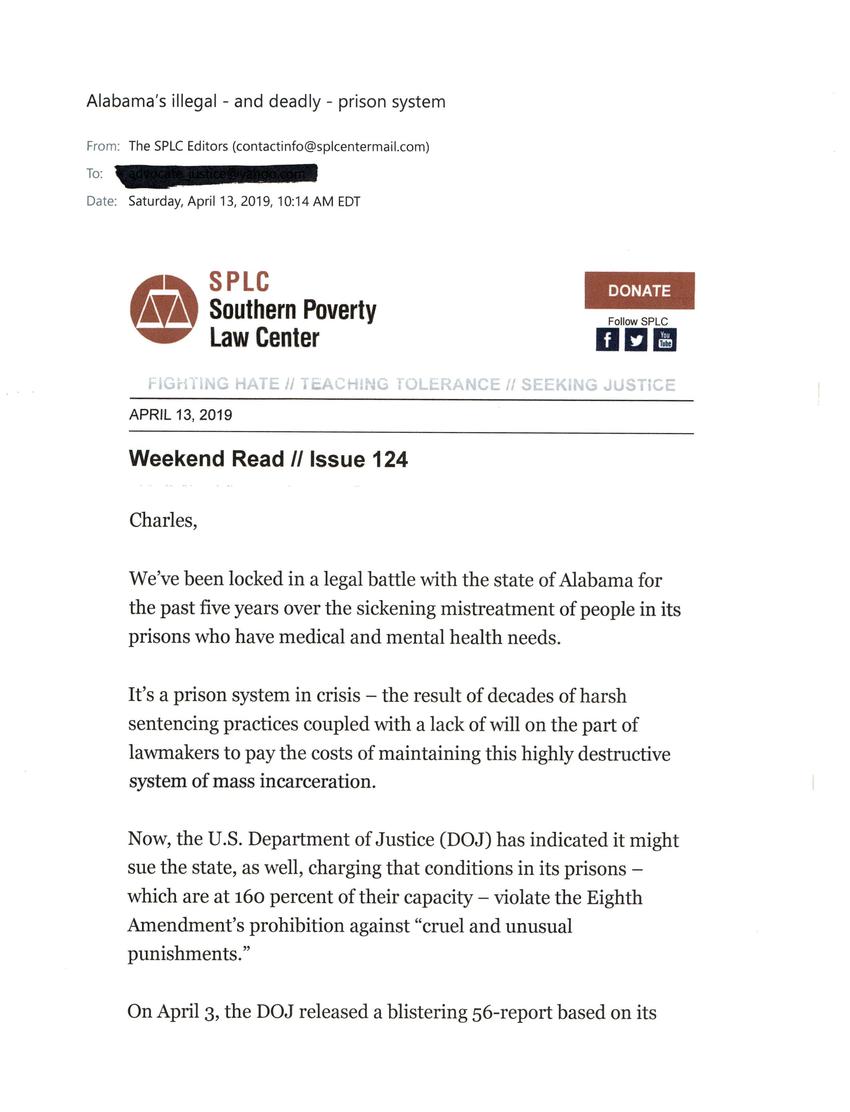
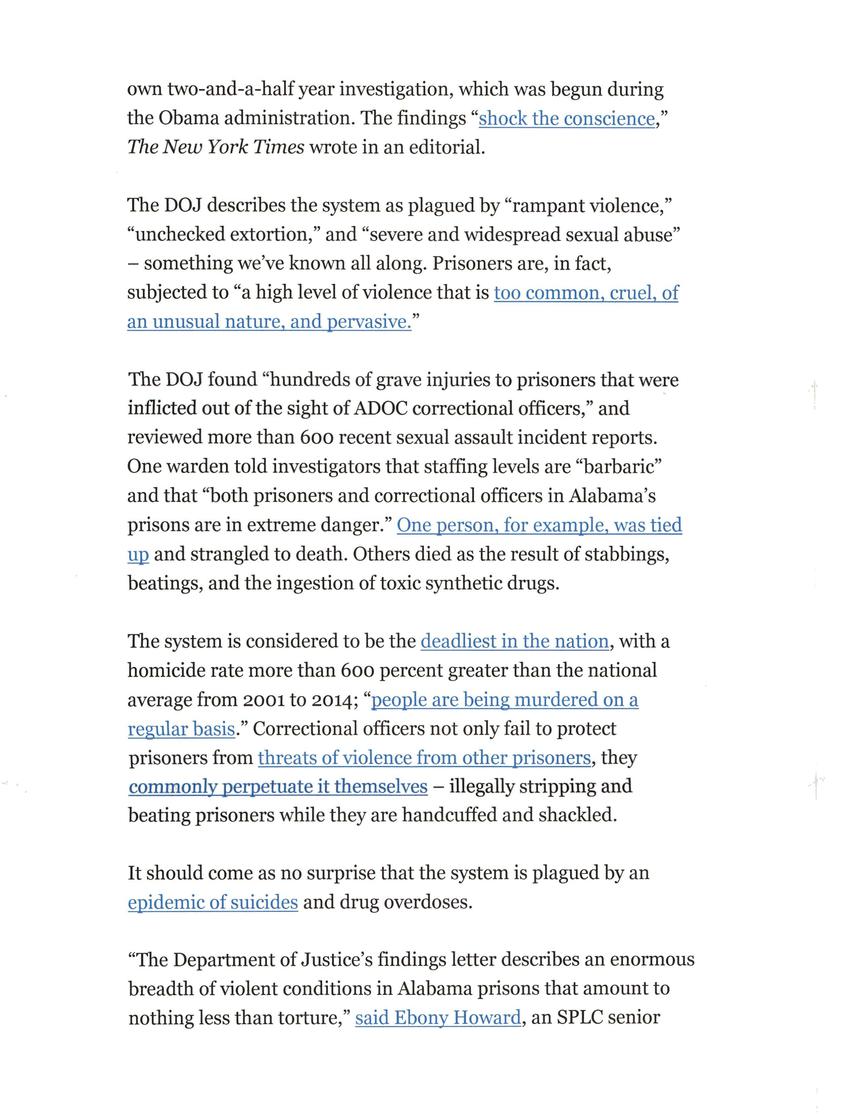
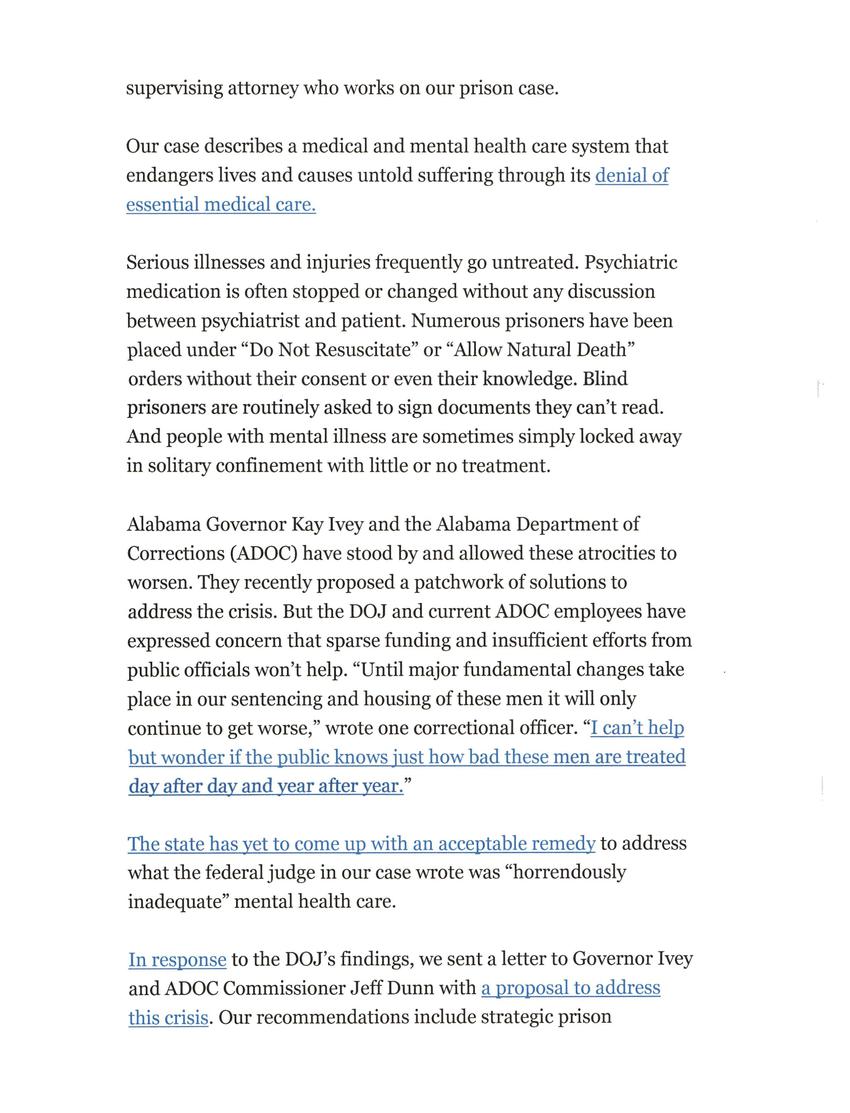
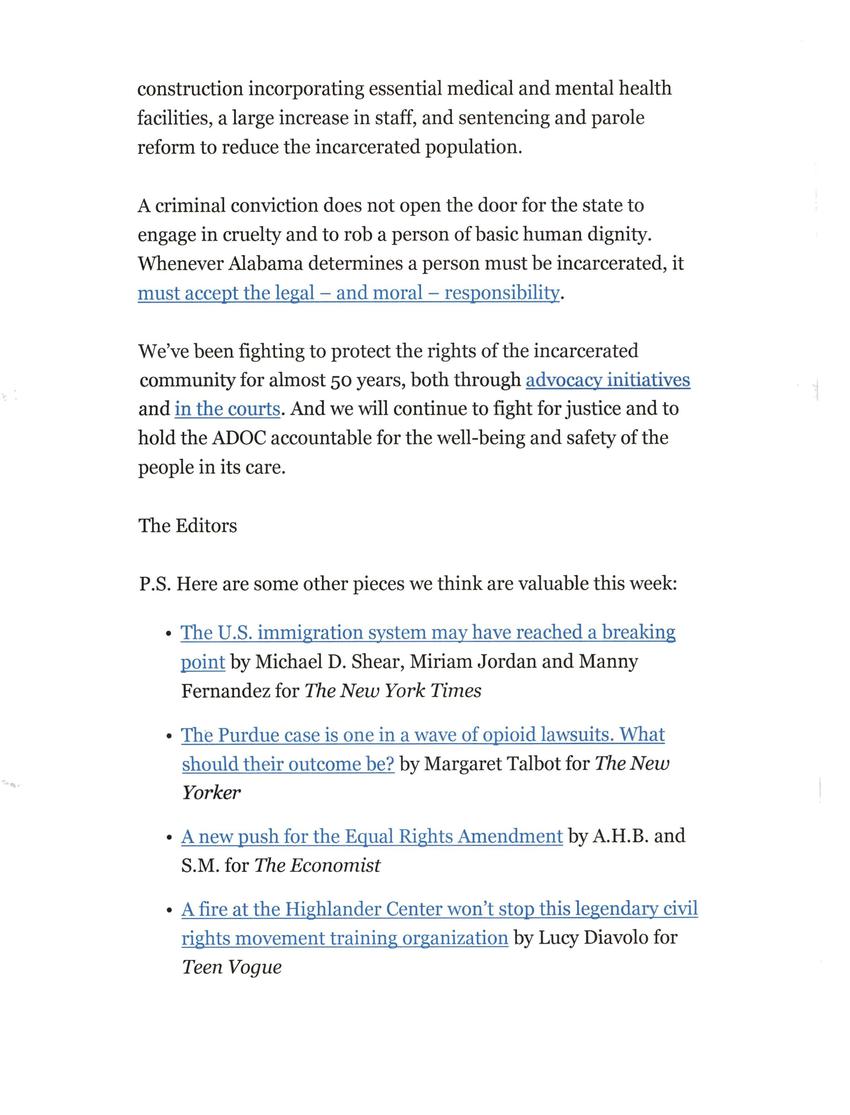
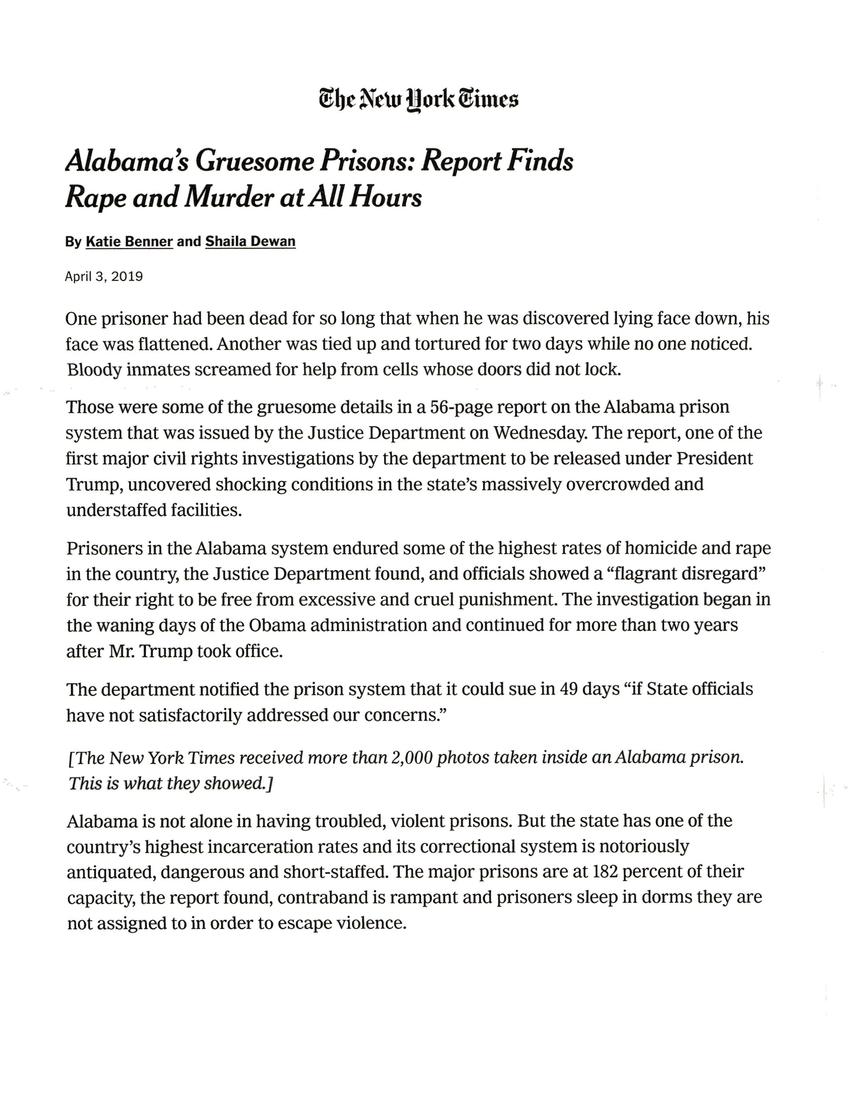
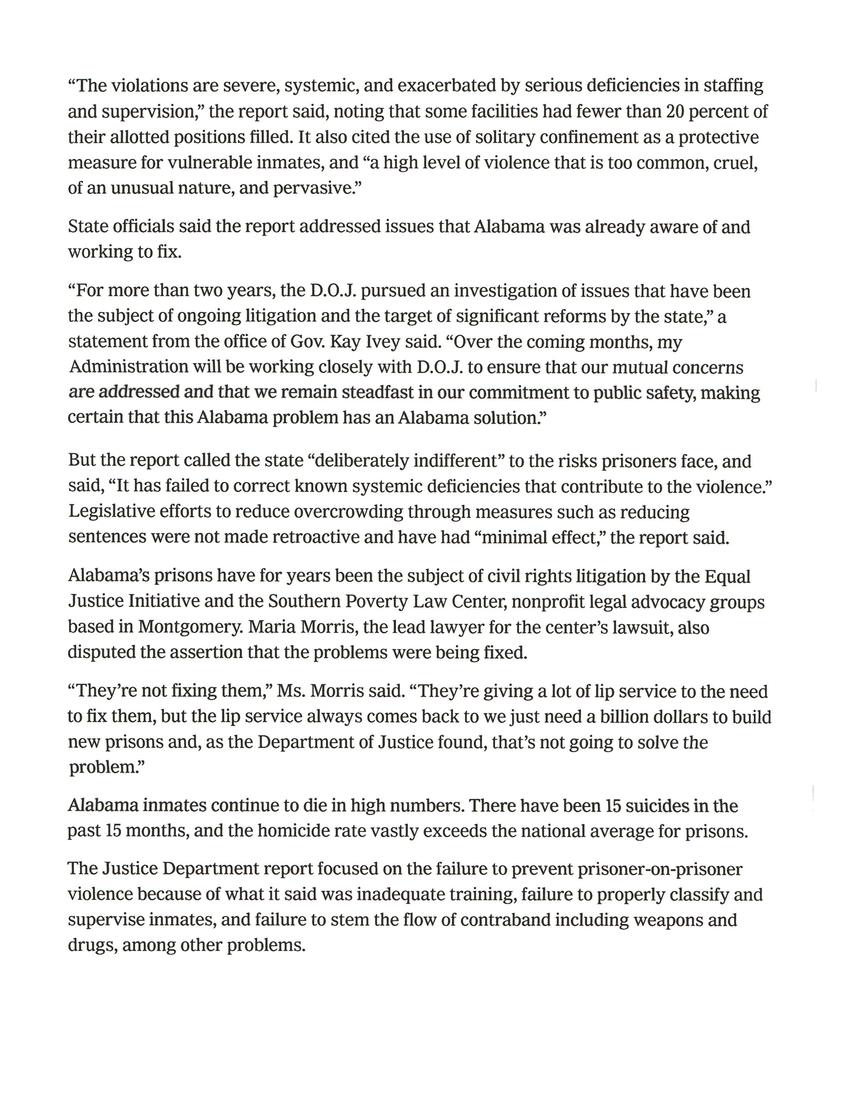

Replies